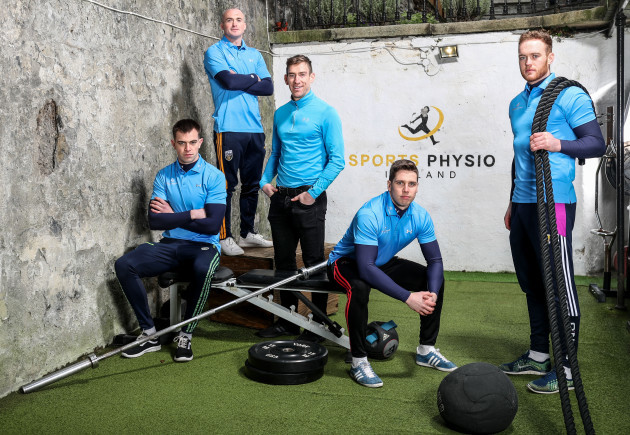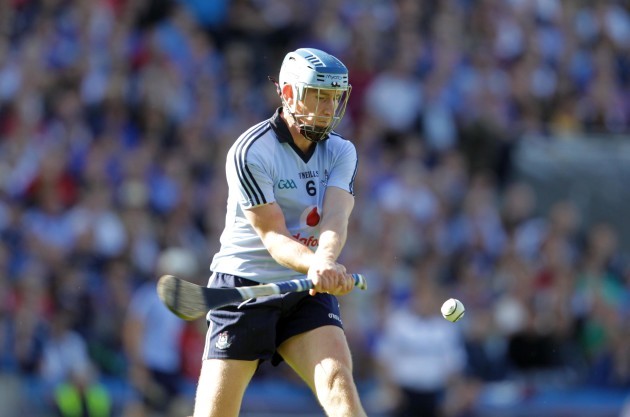WITH GAA TEAMS restricted from training collectively for the foreseeable future and social distancing measures likely to last for some time yet, the situation’s uncertainty poses unique challenges for players and coaches.
The majority of squads at inter-county and club level are following running programmes as they look to maintain fitness levels that were built up since pre-season started months ago. To stay sharp and prepare for a championship that might never come.
Former Dublin hurler Joey Boland believes their time would be better spent working on speed training, rather than trying to maintain endurance much of which will be lost anyway due to a lack of match practice.
Boland’s company Sports Physio Ireland provides physio care for the Dublin hurlers, as well as various club teams in the capital.
“The way we look at it is, you won’t keep your endurance for a match no matter what you do,” he tells The42.
“The type of running you do in small-sided games, or as a wing-back in championship, is chalk and cheese from being able to replicate it on your own. You just can’t.
“No matter how committed you are it’s just so hard. Because there’s a time in a game when you’ve made your two lung-bursting runs, then you might have picked up a different man who makes an agility run at you and you just have to dig deep and get after him.
“That tends to not be able to happen when you’re running on your own.
“Obviously you will do a bit of maintenance stuff, but you’re going to need six weeks training of game-based stuff to get back up to fitness anyway.
“You should use this period of time to clean up injuries and get faster. Do a plyometrics programme and work on that sprinter based stuff.
“Then at least if you learn this now over the next couple of weeks and months, you’ll have it forever. But when you’re in deep training you can’t actually do sprint training because you’ve always a match coming up, you’re recovering from a match, you’ve picked up a dead leg from training or whatever.
“That’s what we’re advising a lot of Dublin lads to do at the moment. That speed stuff you see the sprinters do. It takes about an hour to do all that hopping and jumping, high knees and all those running mechanics.”
Boland says this break is a unique opportunity for players to work on speed training, injury rehab and core strength.
“What we’ve decided to do is, let’s do the fartlek running on a Saturday. Then two midweek speed sessions are going to make the difference so when they do get fit again from games, they’ll have that extra yard of pace that you don’t have a chance ever to do, bar now.
“Because if you’ve training on a Tuesday and Thursday and a game on Sunday, when do you get a chance to do an hour of a good dynamic warm-up, springy stuff, plyometrics, running drills and a few sprints at the end?
“You’ll never get the chance to do it. And in the off-season there’s no point because you need a rest. Players have to look at themselves, get their injuries better, get faster and keep one or two days hard running a week. Then at least when they get back onto the pitch they’ll play three or four matches and they’ll be back up to fitness.
“But they’ll have their injuries sorted, a bulletproof core and they’ll be faster having learned the technique for sprinting.
“That’s our advice to players: use it to your advantage as opposed to just going up to the park a couple of days, do a few runs and pushups. There’s no structure to that.”
Dublin are focusing on clearing up old injuries and weak spots to reduce the risk of breaking down once play eventually resumes.
Sports Physio Ireland were forced to close their doors but they continue to look after clients online.
The 2013 Leinster hurling winner has developed a team training solution specific for GAA teams where players can work on those key areas during these uncertain times.
“We’re launching this Athletic Development Programme and giving GAA players an opportunity to have a programme to follow for 12 weeks so they’re not just picking and choosing stuff from the internet and what they used to do.
“There’s also a specific section for anyone with a history of injuries in a certain area, be it hip, hamstring, groin or ankle issues. So by the time the ban is lifted, your weak spots are bulletproof. There’s also the sprint stuff in it so you’re actually getting faster over the next 12 weeks.
“It’s a structured programme that gives a player a chance to have a schedule in front of them.”
An average week in the programme involves two strength and conditioning sessions, two 60-minute Olympic sprinting sessions and one hard endurance running session.
Two rest days are factored in where athletes can take a day off, or take part in core classes, flexibility work or specific rehabilitation for various injuries.
“What the programme is about is to work on their injuries in their off-season now, have a programme and follow it and get faster while they can,” he adds.
As for the possible return of inter-county action, Boland believes that a minimum six-week pre-season window should be provided for teams on the grounds of player welfare.
“The GAA have to be fair. If the government are asking people to stay within 2km of their house, players in some counties might not have the access to train in the same facilities as others.
“We don’t know when it’s going to reopen, but for me, a six-week period is the minimum required to get players fairly back up. You talk about player welfare, they’ll need six weeks as a team training in order to be safe and ready to go for a championship.”
In the event that championships are run-off on a condensed time-frame, Boland warns that a “massive spike in injuries” is likely if they’re forced to play championship games week-on-week.
“It’s down to fitness coming in two waves. There’s actually being able to do it on the day and with the adrenaline, energy and freshness. But fitness also has to be built up in recovery.
So to play a high-intensity game without much match practice would lead to players finding they “wouldn’t be able to do anything near that again for the guts of 10 days after,” he explains.
“Because your fitness is being actually able to run and do it but there’s another side where no matter how many ice baths you do or how much stretching, your body has to get used to recovering.
“So in the peak of championship with 10 games under your belt, you’ll recover in two days. But that’s going to be the danger.
“If lads are not training or hitting that level of intensity and they’re expected to play four matches in a month, you’re going to see a massive drop-off in performance from week to week and you’re also going to see a massive spike in injuries because players’ bodies just aren’t fresh.
“The recovery fitness as we call it is going to be massively important to try build up and the only way to build that up is games. That’s what the league is for.”
Sports Physio Ireland are offering readers free access to the first class of their online GAA Athletic Programme here
The42 is on Instagram! Tap the button below on your phone to follow us!



